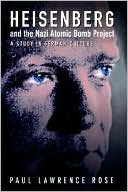

 |

|

The average rating for Heisenberg and the Nazi Atomic Bomb Project, 1939-1945: A Study in German Culture based on 2 reviews is 4 stars.
Review # 1 was written on 2014-01-19 00:00:00 Chris Kirkham Chris KirkhamVery interesting read for those interested in history of science and how science intersects morality (or lack of it) and politics. Book is very damning of Heisenberg's behavior during and after nazi years and I think the criticism is convincing. Especially damning are the quotations from Farm Hall transcripts that reveal bizarrely distorted moral landscape. Technical discussions of German failure in atomic bomb project was interesting, but pales in comparison with the discussions about opportunism, cowardice, and delusional wishful thinking. Sometimes the book was a bit repeative, but I was not overly bothered by it. |
Review # 2 was written on 2008-01-04 00:00:00 Robb Salovich Robb SalovichThis review is highly selective in that I will focus on a term that is often misunderstood. That term is "Jansenism." Who are the Jansenists? And why should one go to Mr. Kolakowski for an understanding of that term? Probably the best explanation is that the book is 'ready to hand' as the Heideggerians would say. Given that we currently live in a time of great turmoil, those of us who wish to remain within some discernible tradition must grasp for the various planks as we can while seeking to keep our heads above water. Jansenists can profitably be contrasts with Jesuits. The Jesuits have put themselves before the reading public in those documented "Relations" which make up an early history of missionary activity in North America. To discuss Jansenism requires some familiarity with the term "Pelagian." This so called reformer taught that man might achieve salvation on his own merits. We are confronted with the ongoing, interminable issue of how salvation is attained. Is it by good works, by inspiration, or by divine grace? Perhaps all three are connected in ways that dim minds are unable to grasp. But dimness, as wide spread as it is, and so often this dimness is hiding behind the most remarkable credentials, is no excuse for avoiding the pressing problem of salvation. If we are not saved, all is for naught. I say again, if we are not saved, all is for naught. Consider the discussions you routinely have with "Joe Everybody." Certainly you sense behind his or her agenda a deep despair. Even if the deal is to be made, where will it take you? Closer to the grave? So, let us not overlook why we need to be concerned about Jansenism. Kolakowski is pointing out that if one condemns Jansenism, and this one is some church authority, one is also condemning Augustine. But we all know that Augustine condemned himself by adhering to Platonism throughout his life. If it hadn't been for his Platonic inclinations perhaps the Church would have been more receptive to the diversity of opinion often found in early experience of Christ. What is the willingness to 'root out heresy' if not a perverted form of Platonism? Leuven is a wonderful center of theology. The department is kept in good condition and there are plenty of resources. In 1640 Jansenius's work Augustinus appeared here. But Jansenius had already moved on to the afterlife. Let us ponder what this work was about/like/readable. According to Kolakowski, Augustinus is a three volume work, "immensely long," dealing with the problems of Pelagianism, the grace offered to Adam and Eve, and the grace offered by Our Lord and Savior, Jesus Christ. Yet Jansenius, much like Origen who was completely misunderstood, was more than willing to submit his work to the authority of Holy Roman Church. We, you and I reader, ask, and so where is your discussion of Anselm, Sir? And where is your discussion of Bonaventure, Sir? Fast forward to the year: 1649. Nicolas Cornet prompted the Sorbonne to issue a condemnation of five statements attributed to Jansenius. This set in motion work which would eventually lead to the Inquisition investigating the opinions expressed. Paul the Fifth issued a statement that the text must be examined for heresy. Urban the Eighth followed in these same steps. Eventually, and this according to our author, the Jesuits succeeded in marginalizing Jansenius. Kolakowski can help you and me by resolving this complicated history into a simple question: God is all powerful so how might his will be foiled by human purposes? Are men responsible for their own damnation? |
CAN'T FIND WHAT YOU'RE LOOKING FOR? CLICK HERE!!!